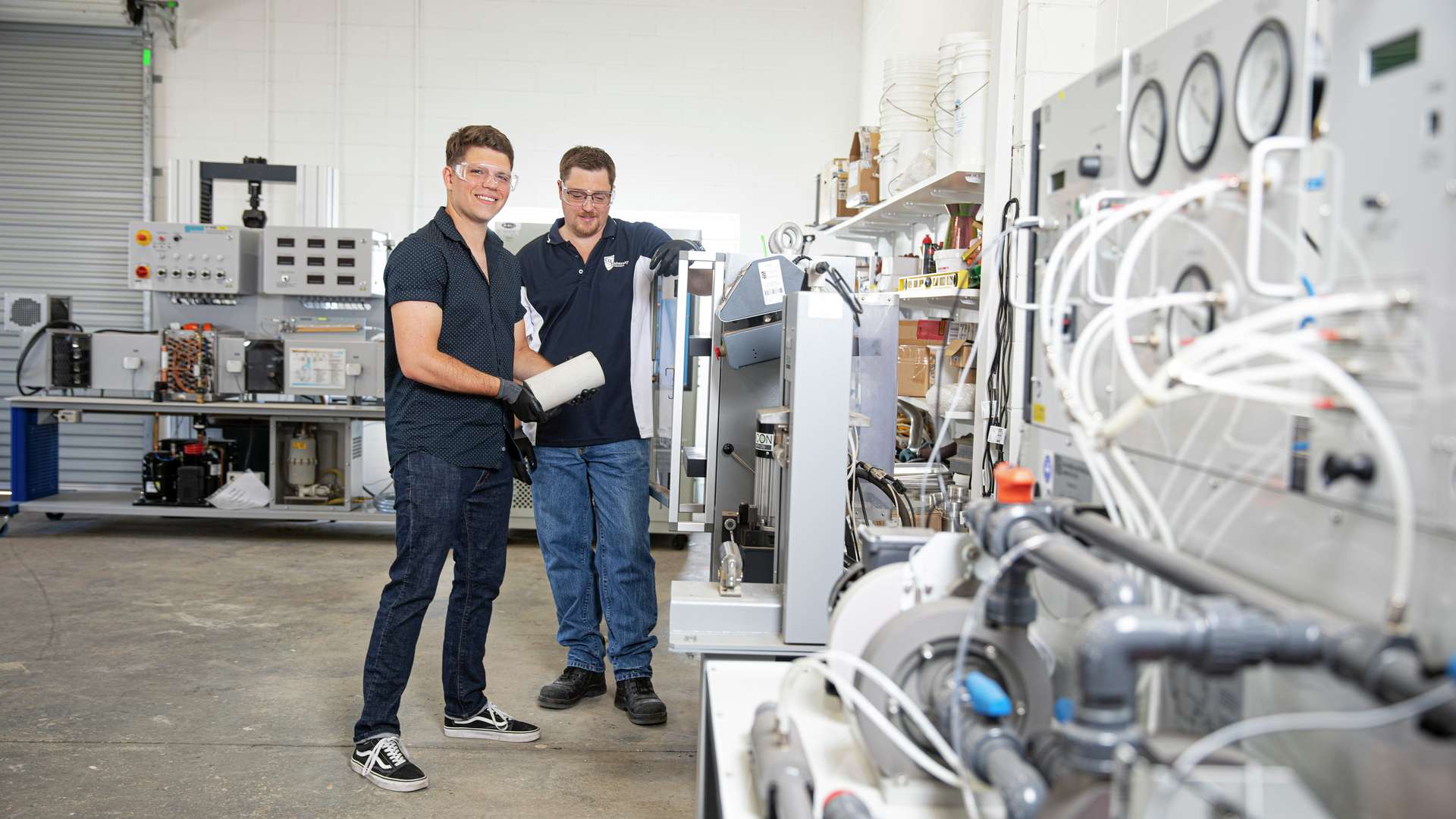
With extensive work-integrated learning opportunities and 48 weeks of paid industry placement, our Bachelor of Engineering (Honours) and Diploma of Professional Practice (Co-op Engineering) provides you with vast opportunities to gain real-world experience to prepare you for your career as a professional engineer.
The Bachelor of Engineering (Honours) and Diploma of Professional Practice (Co-op Engineering) allows you to gain hands-on experience in a professional industry environment, being paid while you learn. The course strongly focuses on contextual learning and promoting sustainable development so that you will apply theory to authentic scenarios throughout your course.
In your first year, you will develop skills in problem-solving, teamwork and professional practice together with learning foundation technical content. By the end of your first year, you will have experienced many engineering projects which will assist you in deciding which engineering discipline and course major you wish to pursue. Your choice of major includes:
Featuring 48 weeks of paid work placement and project-based learning, you will develop the professional skills required to work as an Engineer and graduate with one year of industry experience.
One of the benefits of studying engineering at CQUniversity is our strong connections with industry practitioners who offer support through scholarships, guest lectures, work-integrated learning and cadetship opportunities.
Discover more about your industry-accredited engineering degree and how you'll benefit from 48 weeks of paid industry placement. Click 'Explore Study Experience' for more information.

To anybody considering studying at CQUniversity I would say, hands down, consider it, enrol, start. It is a brilliant university and it will set you up for a great career.
Shaye Byrne
Bachelor of Engineering (Honours) and Diploma of Professional Practice (Co-op Engineering)
The Bachelor of Engineering (Honours) and Diploma of Professional Practice (Co-op Engineering) is your gateway into the engineering industry. Upon completion, you will be qualified to work as a Professional Engineer.
The course structure and available locations can change depending on when you want to study. You can choose the intake that best suits you in the drop-down menu below.
Depending on your chosen major, you must complete either 32 or 33 units (234 credits):
You will study 12 units, including the first 11 units listed below. You will then choose one elective from:
The Civil Major consists of the 20 units, including the 19 units listed below. You will also need to complete an elective unit. The elective unit options available as part of this major are listed in the course planner. Use the course planner button below to learn more.
This major provides a comprehensive foundation in the essential infrastructure systems that support and enhance modern society. By integrating engineering principles with mathematics and physics, you will develop expertise in the design, construction, and maintenance of the built environment, including transportation networks, structural systems, and water infrastructure. Emphasising sustainable and ethical practice, this discipline prepares you to address real-world challenges that advance public safety, resilience, and quality of life.
To help you plan your studies and see which unit comes first, if one unit should be completed before another and the term you will study each unit, check out our course planners.
The CC32 Bachelor of Engineering (Honours) Co-op course is fully accredited* by Engineers Australia.
Graduates are recognised as professional engineers and are eligible for Graduate membership with EA.
*The following recently introduced majors have provisional accreditation until there are sufficient graduates for them to be reviewed by EA:
The CC32 Bachelor of Engineering (Honours) Co-op course is fully accredited* by Engineers Australia.
Graduates are recognised as professional engineers and are eligible for Graduate membership with EA.
*The following recently introduced majors have provisional accreditation until there are sufficient graduates for them to be reviewed by EA:
The CC32 Bachelor of Engineering (Honours) Co-op course is fully accredited* by Engineers Australia.
Graduates are recognised as professional engineers and are eligible for Graduate membership with EA.
*The following recently introduced majors have provisional accreditation until there are sufficient graduates for them to be reviewed by EA:
24 weeks industry placement
24 weeks industry placement
The above industry placements you complete are paid placements in your relevant field of engineering and are coordinated by the University.
If you have completed prior study relevant to units within this course, you may be eligible for credit for your past studies.
For your application to be considered, you must meet the following entry requirements.
View the student and course profiles for this course and learn about CQU's Undergraduate Profile for Term 1, 2025 via our Institute Profile.
CQU offers a range of alternative entry pathways to help you get started. If you don’t meet the entry requirements, there are options available, depending on your background and previous experience.
While not needed to apply, you'll need to meet the following requirements throughout your studies.
The Indicative First-Year Fee is the approximate cost of enrolling in this course for one full-time academic year (eight units over two terms) for a Commonwealth Supported Place (CSP) and should be used as a guide only. Your actual fees may vary depending on the units you select to study and your study load. Check the Cost per Unit spreadsheet available on our Understanding Course Fees webpage.
Fees are reviewed each year and are subject to change. Fee estimates for the following year are expected to be available in September each year.
This course has Commonwealth Supported Places (CSPs) available, and as a domestic student, you'll be offered a CSP, provided you meet CSP eligibility requirements. CSPs are subsidised by the Australian Government, meaning you are only required to pay the student contribution rather than full tuition fees.
You may be eligible for a HECS-HELP government loan if you are offered a CSP. HECS-HELP is an Australian Government loan scheme that assists you in paying your student contributions. Provided you meet the HECS-HELP eligibility criteria, you may use HECS-HELP to defer part or all of your student contribution fees.
Part of your course costs will include Student Services and Amenities Fees (SSAF). SSAF is charged in addition to your student contribution or tuition fees and is used to help enhance your study experience. There may also be other costs as part of your studies, such as textbooks, technology expenses, travel expenses, professional certifications, uniforms, or vaccinations.
We believe a quality education can be for everyone – regardless of background, location, or life circumstances. That's why we offer a variety of scholarships and bursaries that can give you a helping hand with a range of expenses and enhance your employability.
Kickstart your engineering career with CQUniversity's Engineering Cadetship Program. In partnership with a variety of organisations, you can build industry connections and gain hands-on experience, earn while you learn, and receive support throughout your studies.
Check what you need to do to apply to study this course.
Prior to applying, take a look at important application dates and learn about our admission considerations, such as information for domestic students with overseas qualifications, indigenous support, and elite athlete, coach and performer support. You should also check out the adjustment schemes that might be available to you and how to access them. You can also explore our offer information to learn more about what happens after you've submitted an application and how to respond to an offer to study with CQU.
When applying through a tertiary admissions centre (TAC) you can use the relevant TAC code below to search for a course or add it to your application preferences.
CQUniversity Australia is a trading name of Central Queensland University
ABN: 39 181 103 288
RTO Code: 40939
CRICOS: 00219C
TEQSA: PRV12073